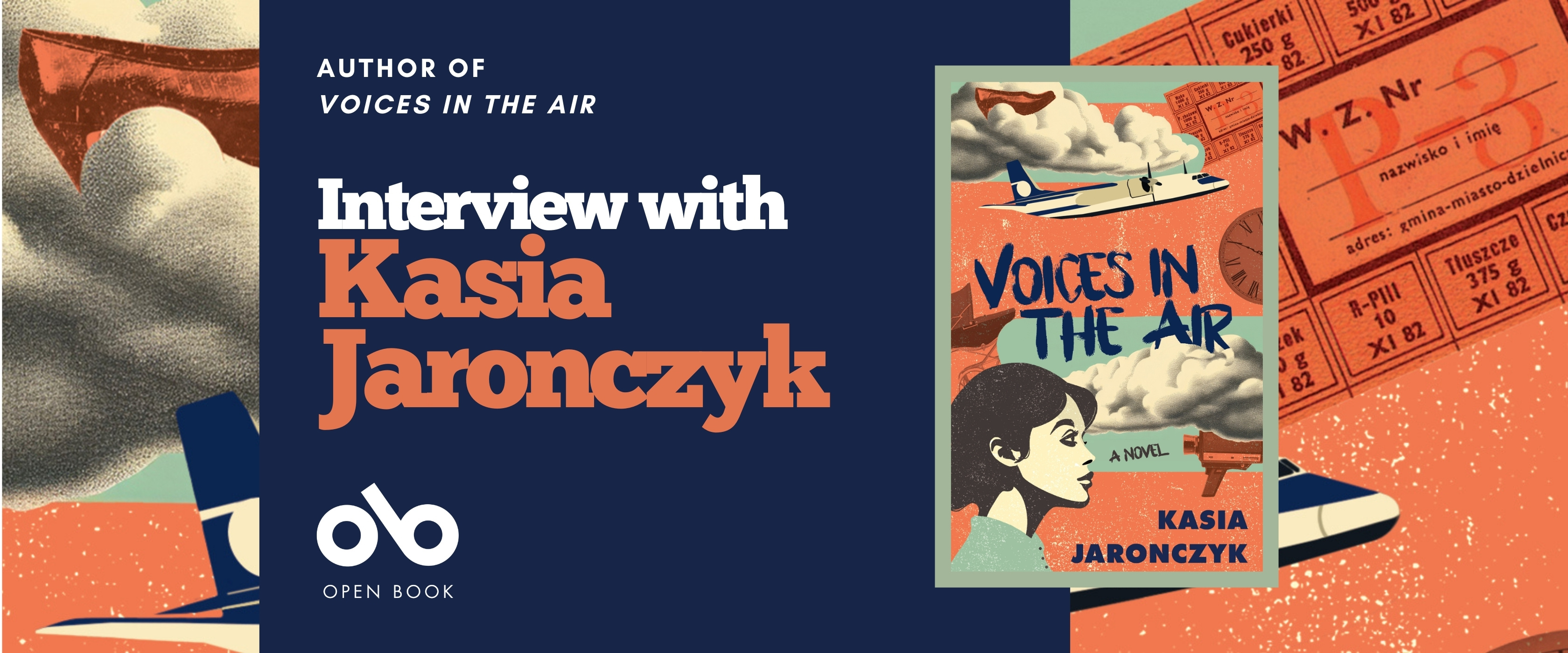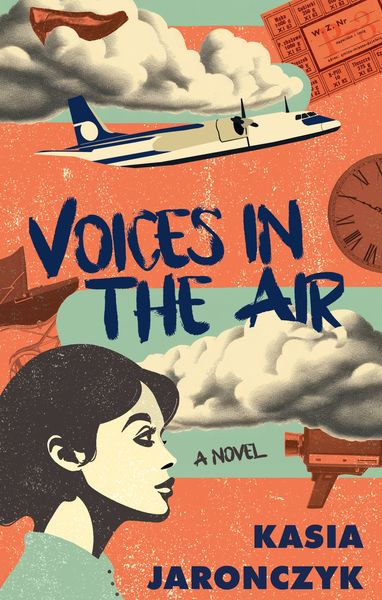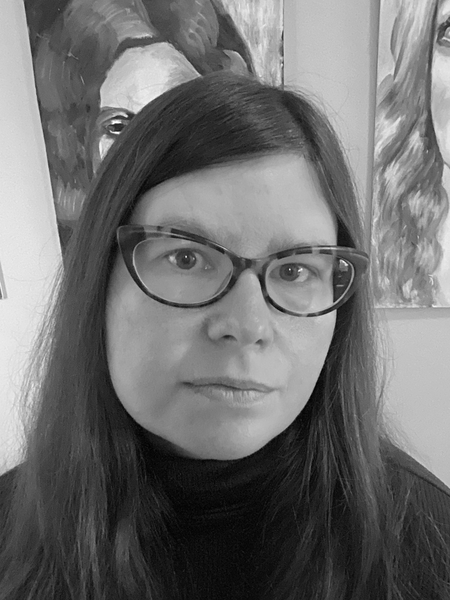Two Women Risk Everything to Escape Communist Poland in Kasia's Jaronczyk's Riveting Debut Novel
Prolific author Kasia Jaronczyk has had works of fiction and nonfiction published widely in journals and anthologies, and her keen voice has long been on display for readers. As an author with Polish roots (emigrating to Canada at 14), her work often shares a window into the stories of the Polish diaspora, and those who have experienced hardship as a result of past events in Poland that have forever left a mark on those who have left the country, and those who remain.
The author brings all of this to bear in Voices in the Air (Palimpsest Press), this time turning to novel-length fiction to capture the harrowing and heartrending tale of two women who hijack a passenger place to escape 1980s Communist Poland. The characters within are normal folks, with normal vocations and lives, but who find themselves forced to risk their lives and the lives of their families to leave their mother country.
Read more about this riveting new work our Long Story Novelist interview with Jaronczyk, where she talks about the unique form and structure of the novel, and her inspirations for writing it.
Open Book:
Do you remember how your first started this novel or the very first bit of writing you did for it?
Kasia Jaronczyk:
As a first-generation Polish immigrant, I have always been fascinated with stories of escape over the Iron Curtain, such as the different ways people crossed the Berlin Wall; I even wrote a short story about it once. I discovered that there were similar stories about people leaving Communist Poland. During the two years of Polish Martial Law (1981-1983), there were 15 attempts at airplane hijackings, of which ten were successful. When you think about it, that is about a hijacking every other month! I thought, here is a great subject that no one has written about yet. If even a lot of Polish people don’t know about these escapes, they could be interesting to the English-speaking audience too. What is so fascinating about it is that most of the hijackers were average people with families that only wanted a better life. Most of them did not even bring any weapons onto the airplane. This contrasts with the typical image of hijackers people have today as armed terrorists whose aim is destruction and murder.
The actual hijacking that my novel inspired by was intriguing because it involved several families who hijacked the airplane, and two-thirds of the 50 passengers on board had known about the plan. I have children, so I naturally I wondered whether I would ever be able to make such a risky move and what would drive me to do it. As I researched further, I found that there was no information at all about the women who were involved, and they interested me the most. I wanted to give them a voice, find out what their roles might have been and what influenced them the most: the patriarchal society, their own relationships, the difficult economy, or politics. I imagined what their lives would be like afterwards. I was interested in the idea of questionable morality of their decision, whether it was worth it and whether they regretted it.
OB:
How did you choose the setting of your novel? What connection, if any, did you have to the setting when you began writing?
KJ:
The idea for the setting came from a famous photograph by the British-Polish photographer Chris-Niedenthal, taken on the day when Martial Law was announced by General Jaruzelski. The picture shows a tank parked in the snow outside the ‘Moscow Cinema’ in downtown Warsaw, with a group of soldiers, and a few frightened people skulking past them. The movie playing at that time, advertised on a large banner across the top of the building was Apocalypse Now, perfectly reflecting the atmosphere of fear and paranoia of that time. This photo was smuggled to West Berlin by a random German student that Chris-Niedenthal spotted at a train station (as if in a Hollywood movie!) and was published in Der Spiegel and Newsweek. In the photograph, I noticed a woman in a coat with a fur trim with a purse over her arm, and I decided she would be one of the characters in my novel.
OB:
Did the ending of your novel change at all through your drafts? If so, how?
Your CanLit News
Subscribe to Open Book’s newsletter to get local book events, literary content, writing tips, and more in your inbox
KJ:
I wanted to connect the hijacking from1982 to the present time, thematically and through the characters. One of them ends up volunteering to help the refugees stranded in the swampy primeval Białowieża Forest on the border between Belarus and Poland. The migrant pushbacks and deaths at the border are a continuing, unresolved issue. In 2023 while I was querying my novel, Agnieszka Holland released a film about it called The Green Border.
My character, Bożena, is an artist who had been a pregnant teenager on the hijacked airplane. As an artist myself, I questioned the purpose of art in situations like a pandemic, refugee crisis, or a natural disaster, when people would need medicine, food and other aid; questions that Bożena struggled with as well. My original idea was that she would deliver art supplies to the children at the border, so that they would find a way to express their feelings, temporarily escape their situation, and perhaps use art as therapy to process their trauma. However, it felt a bit flat to me. And then, while writing, I realized that she would find a dead couple in the forest with a surviving baby. And that she would have to make a decision about them that would be morally questionable, against the law, but also the only humane one. This new ending seems perfect to me, as it directly reflects the main themes of the novel, and also echoes back to a scene with another baby from beginning of the novel, born to a Jewish prisoner in a cotton mill.
OB:
Did you find yourself having a "favourite" amongst your characters? If so, who was it and why?
KJ:
I enjoyed and love all the characters in my novel, but I think I had the most fun creating Ania, the flight attendant. I immediately loved her irreverent, provocative voice, especially in her interactions with her inhibited rural cousin. These sections were more humorous and lighter than the other parts of the book, and therefore more enjoyable to write and invent. However, underneath that bravado was a woman desperately in love with a married man and willing to do anything to be with him. After the hijacking I felt great sympathy for her stubborn belief, in spite of everyone, that her daughter will one day be able to respond to her and communicate. I think that kind of stubborn belief in oneself, that desperate optimism against all odds, bordering on denial, is sometimes the only way we can survive.
OB:
If you had to describe your book in one sentence, what would you say?
KJ:
A novel based on real events, about how, on April 30, 1982, during Polish Martial Law, several women and their families hijacked a Polish passenger plane flying from Breslau to Warsaw in a bold attempt to escape across the Iron Curtain to find safety in West Berlin, and how questionable moral choices, fate, and regret change human lives in unpredictable ways and constantly mock our plans and expectations.
OB:
Did you do any specific research for this novel? Tell us a bit about that process.
KJ:
I did considerable research for this novel. I was only five years old during Martial Law in Poland, so even though I lived there at the time, I have no memories of it. My first resource was my father, and then I read a lot of Polish books with average people’s personal recollections. Because there are a lot of characters in the novel, each with their own specific life story – I wanted the women’s lives to be interesting and meaningful even if the hijacking hadn’t happened – I had to research a lot of different aspects of life in Communist Poland. Among them were: the cotton mill industry, the history of the city of Otwock and the orthopedics hospitals there, the Polish movie industry and censorship, Antonov AN 45 airplane seat layout, the lives and training of flight attendants, the Polish Secret Police and Military function in society and in airport security during the Martial Law, airplane hijackings in Poland, hunger strikes, and finally, a little known story of a farm girl who had a vision of the Virgin Mary in the 1950’s, which I conveniently moved forward by thirty years. What helped me a lot was that I am a native Polish speaker, so I could access a lot of material in the Polish language. Also, I want to thank Łukasz Wolak, whose article was the first article I read online about the April 30, 1982 airplane hijacking that inspired the novel. Lukasz was very forthcoming and generous in sharing all he knew about it.
Initially I thought I would write a non-fiction book about this specific hijacking. However I couldn’t find any information online about the women who were involved or their families, or their lives afterwards. The Institute of National Remembrance in Poland refused to give me any information about the hijackers because I am not a journalist, so I had to invent all my characters and their lives before and after the hijacking, which I think worked out for the best in the long run.
OB:
Who did you dedicate your novel to, and why?
KJ:
I dedicated the book to the generations of women in my family who came before me, because I realized, as I was writing it, that almost every female character that I invented had traits and experiences that were in some parts either mine, or my mother’s, or my both grandmothers’, and I wanted to celebrate and appreciate that. This is especially poignant to me because my mother died four years ago, before I started writing this novel, and she had always told me to write about Poland. I wish so much she were here to experience the publication of this book with me.
__________________________________
Kasia Jaronczyk is a Polish-Canadian writer, artist and microbiologist. She immigrated to Canada at the age of 14. Her debut short story collection Lemons was published in 2017 by Mansfield Press. She is a co-editor of the only anthology of Polish-Canadian short stories Polish(ed): Poland Rooted in Canadian Fiction (Guernica Editions, 2017). Her stories were short-listed for the Bristol Prize 2016 and long-listed for CBC Short Story Prize 2010. She has published in Canadian literary magazines such as TNQ, Room, Prairie Journal, Carousel, The Nashwaak Review, Postscripts to Darkness, and in anthologies Wherever I Find Myself. Essays by Canadian Immigrant Women (Miriam Matejova, Ed. Caitlin Press, April 2017) and The Bristol Short Story Prize Anthology (2016. Vol 9.).






